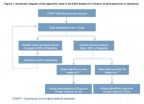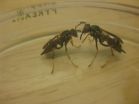(Press-News.org) Curtin University researchers have found a way to breed disease-resistant wheat with no downside, potentially bringing multi-million dollar savings to Australia's agricultural industry.
According to John Curtin Distinguished Professor Richard Oliver, Director of the Australian Centre for Necrotrophic Fungal Pathogens (ACNFP) at Curtin, farmers can lose more than 0.35 tonnes per hectare in wheat yields to Yellow Spot, even after applying fungicide.
For an average-sized farm of 4000 hectares, this could mean an almost $500,000 loss to disease per year – or about $212 million worth of damage to the wider Australian agricultural industry.
Funded by the Grains Research & Development Corporation, Professor Oliver and his team, in conjunction with independent research provider Kalyx Australia, have demonstrated that by taking away disease-sensitivity genes from the wheat germplasm, pathogens find it difficult to latch onto wheat and cause damage.
"Our finding will help breeders produce crops in which disease losses are 60 to 80 per cent lower, and would be a real win for farmers – they will often be able to avoid using foliar fungicides," Professor Oliver said.
"Before now, breeding for resistance to Yellow (Tan) Spot and Septoria Nodorum Blotch was very time-consuming – no molecular markers were in use. The key has been to supply breeders with specific proteins (we call them effectors) that the fungi use to cause disease.
"For the first time, our technology allows for a steady and sustained improvement in disease resistance without affecting the farmer's pocket.
"Furthermore, breeders are able to devote more time and resources to breeding for yield, as well as for rust and frost resistance."
Using large wheat variety trials provided by Kalyx Australia, the team looked at yield loss of different cultivars (plants chosen for breeding because of desirable characteristics) when subjected to natural disease and stress pressures in the WA wheatbelt.
They compared cultivars with disease-sensitivity genes to cultivars that lacked these particular genes, and were able to show that the cultivars lacking the gene showed no yield loss and in some instances increased yields in the presence of disease.
From this, the team were able to conclude if a sensitivity gene was eliminated, there would be minimal associated risks and it would be a safe and straightforward strategy for improving disease resistance.
Professor Oliver said this research had never been done before as direct mapping for disease resistance had not led to useful molecular markers.
"Previously geneticists would infect plants that were progeny of crosses between relatively resistant and relatively susceptible parents before doing the QTL (quantitative disease-resistance gene) mapping. But as disease resistance is multifactorial due to the several effector reactions, the QTL mapping was always a bit fuzzy and was therefore never passed on," Professor Oliver said.
"Our research looks directly at the loci that recognise the pathogens, which can be readily identified using a process we developed earlier, thereby bypassing the need for QTL mapping."
INFORMATION:
The paper, Absence of detectable yield penalty associated with insensitivity to Pleosporales necrotrophic effectors in wheat grown in the West Australian wheat belt, can be found at http://onlinelibrary.wiley.com/doi/10.1111/ppa.12191/abstract
Genetic discovery to keep crops disease-free
New breeding technology could save farmers millions
2014-02-10
ELSE PRESS RELEASES FROM THIS DATE:
Slowing down the immune system when in overdrive
2014-02-10
Many people suffer from chronic inflammation because their immune systems overreact to 'self' tissue. Sydney scientists believe that a small molecule known as Interleukin 21 is a promising therapeutic target in such cases.
Interleukin 21 (IL-21) is one of a group of chemical messengers known as 'cytokines', which affect the behaviour of immune cells. IL-21 is already well known to play an important role in autoimmune diseases such as Sjögren's syndrome and type 1 diabetes.
The current study shows how much IL-21 contributes to inflammation. It also shows how important ...
When you always gotta go…
2014-02-10
Problems related to urination, including incontinence and having to get up to urinate at night-time, have become more acceptable topics of discussion over recent years. New treatment options have also led doctors to address these symptoms more actively. Despite this, no study has effectively compared the bother of each of these bladder symptoms for men and women of all ages.
The FINNO Study is an ongoing questionnaire survey conducted right across Finland. A random sample of 6,000 adults identified from the Finnish Population Register, were contacted with a questionnaire ...
New trial results affirm better blood pressure management during C-section
2014-02-10
10 February 2014, Singapore: New trial results1 have shown that the world's first Double
Intravenous Vasopressor Automated (DIVA) System affords superior control of maternal blood pressure in women undergoing caesarean section under spinal anaesthesia, when compared with manually-administered medication to manage reduced blood pressure (vasopressor).
Developed by doctors at KK Women's and Children's Hospital (KKH), the novel DIVA System detects and responds rapidly to low blood pressure and/or slow heart rate in real time by auto-administering a precise amount of the ...
Normal enzyme aids a mutant 1 to fuel blood cancer's growth
2014-02-10
BOSTON (Feb. 10, 2014)—Reinforcing the need to look beyond genomic alterations to understand the complexity of cancer, researchers from Dana-Farber/Boston Children's Cancer and Blood Disorders Center report that a normal enzyme called SYK pairs with FLT3, the most commonly mutated enzyme found in acute myelogenous leukemia (AML), to promote progression of the disease. This molecular partnership also promotes AML cells' resistance to treatment with FLT3-blocking drugs, potentially explaining the relatively poor showing of FLT3 inhibitors in multiple clinical studies. In ...
Flat-pack lens boosts solar power
2014-02-10
Micro-machining could be used to create almost flat, Fresnel lenses, that boost the electrical efficiency of solar panels, according to researchers in China.
Fresnel lenses were invented by French engineer and scientist Augustin-Jean Fresnel, in the early nineteenth century, they are essential two-dimensional equivalents of conventional optical lens, but they have ridges in concentric rings that focus the light to a point behind the lens without the three-dimensional bulk of a conventional lens. Image quality is reduced when using a Fresnel lens to focus because the concentric ...
Study reveals unexpected cell hijack method in pancreatic cancer
2014-02-10
Pancreatic stellate cells, which normally aid tissue repair, unwittingly help pancreatic cancer grow and spread in a method of 'cell hijack' only seen before in brain and breast cancer, according to new research from Queen Mary University of London.
The research, published in the latest issue of EMBO Molecular Medicine and carried out by Queen Mary's Barts Cancer Institute, also revealed the process can be blocked, thereby preventing the growth and spread of the tumour.
The study, funded by the UK charity Pancreatic Cancer Research Fund, set out to investigate the messaging ...
EORTC characterizes responders & survivors on pazopanib for advanced soft tissue sarcoma
2014-02-10
An EORTC analysis appearing in Annals of Oncology confirmed the importance of known prognostic factors such as performance status and tumor grading for having a long-term outcome in patients treated with pazopanib for metastatic soft tissue sarcoma. Additionally, hemoglobin at baseline was found to be a new prognostic factor.
Soft tissue sarcomas are a heterogeneous and relatively rare tumor with an estimated incidence of four per 100,000 people per year in Europe. The prognosis for patients with this disease is favorable if they are diagnosed at an early stage and if ...
Massive neutrinos solve a cosmological conundrum
2014-02-10
Scientists have solved a major problem with the current standard model of cosmology identified by combining results from the Planck spacecraft and measurements of gravitational lensing in order to deduce the mass of ghostly sub-atomic particles called neutrinos.
The team, from the universities of Manchester and Nottingham, used observations of the Big Bang and the curvature of space-time to accurately measure the mass of these elementary particles for the first time.
The recent Planck spacecraft observations of the Cosmic Microwave Background (CMB) – the fading glow ...
Wasps use ancient aggression genes to create social groups
2014-02-10
Aggression-causing genes appeared early in animal evolution and have maintained their roles for millions of years and across many species, even though animal aggression today varies widely from territorial fighting to setting up social hierarchies, according to researchers from Iowa State University, Penn State and Grand Valley State University.
If these "mean genes" keep their roles in different animals and in different contexts, then perhaps model organisms -- such as bees and mice -- can provide insights into the biological basis of aggression in all animals, including ...
Dental care in school breaks down social inequalities
2014-02-10
A new survey conducted by the University of Copenhagen and the World Health Organization (WHO) is highlighting the role of schools in work to promote health and prevent disease.
"Children in Scandinavia generally have healthy teeth and gums, largely on account of dental care in schools for all children, the arrival of fluoride toothpaste on the market, a healthy lifestyle and high living standards. But the situation in the poorest countries of the world is very different to that in Scandinavia. However, it is positive to note that the WHO's Health Promoting Schools Initiative ...
LAST 30 PRESS RELEASES:
New knowledge on heritability paves the way for better treatment of people with chronic inflammatory bowel disease
Under the Lens: Microbiologists Nicola Holden and Gil Domingue weigh in on the raw milk debate
Science reveals why you can’t resist a snack – even when you’re full
Kidney cancer study finds belzutifan plus pembrolizumab post-surgery helps patients at high risk for relapse stay cancer-free longer
Alkali cation effects in electrochemical carbon dioxide reduction
Test platforms for charging wireless cars now fit on a bench
$3 million NIH grant funds national study of Medicare Advantage’s benefit expansion into social supports
Amplified Sciences achieves CAP accreditation for cutting-edge diagnostic lab
Fred Hutch announces 12 recipients of the annual Harold M. Weintraub Graduate Student Award
Native forest litter helps rebuild soil life in post-mining landscapes
Mountain soils in arid regions may emit more greenhouse gas as climate shifts, new study finds
Pairing biochar with other soil amendments could unlock stronger gains in soil health
Why do we get a skip in our step when we’re happy? Thank dopamine
UC Irvine scientists uncover cellular mechanism behind muscle repair
Platform to map living brain noninvasively takes next big step
Stress-testing the Cascadia Subduction Zone reveals variability that could impact how earthquakes spread
We may be underestimating the true carbon cost of northern wildfires
Blood test predicts which bladder cancer patients may safely skip surgery
Kennesaw State's Vijay Anand honored as National Academy of Inventors Senior Member
Recovery from whaling reveals the role of age in Humpback reproduction
Can the canny tick help prevent disease like MS and cancer?
Newcomer children show lower rates of emergency department use for non‑urgent conditions, study finds
Cognitive and neuropsychiatric function in former American football players
From trash to climate tech: rubber gloves find new life as carbon capturers materials
A step towards needed treatments for hantaviruses in new molecular map
Boys are more motivated, while girls are more compassionate?
Study identifies opposing roles for IL6 and IL6R in long-term mortality
AI accurately spots medical disorder from privacy-conscious hand images
Transient Pauli blocking for broadband ultrafast optical switching
Political polarization can spur CO2 emissions, stymie climate action
[Press-News.org] Genetic discovery to keep crops disease-freeNew breeding technology could save farmers millions


